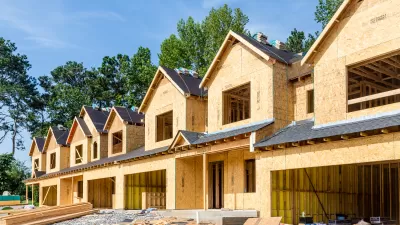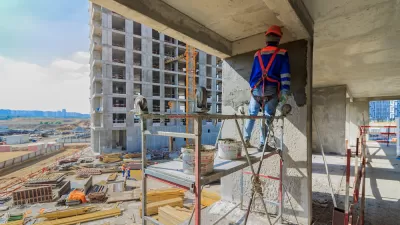The financialization of the housing sector is driving up costs for ordinary families and keeping available units off the market.

The growing impact of institutional investors on the housing market is driving up housing costs for most Americans, asserts a new report from the Institute for Policy Studies (IPS) and Popular Democracy, reinforcing a common belief that the financialization of housing is making it a commodity out of reach for many ordinary households.
According to a Common Dreams article by Julia Conley, “The two groups found that a small number of wealthy individuals and their investment arms, who control "huge pools of wealth," have spent some of their vast resources on "predatory investment and wealth-parking in luxury housing"—contributing significantly to the crises of unaffordable rents, out-of-reach homeownership, and homelessness.”
While the housing crisis is usually blamed on a supply and demand mismatch, “the reality is that the owners of concentrated wealth... are playing a more pronounced role in residential housing, thereby creating price inflation, distortions, and inefficiencies in the market.”
The report includes an example from Los Angeles, where in 2017 there were 93,500 vacant units and roughly 36,000 unhoused residents. Meanwhile, investors are encroaching on the affordable housing market, buying up multifamily properties and mobile home parks and raising costs for tenants. “Corporate ownership of rental housing stock ‘has not translated into housing stability, particularly for working-class households and communities of color,’ reads the report.”
The report urges policymakers to create more public and non-profit housing that can’t be sold at a profit, expand protections for affordable homes, and limit corporate ownership and vacancy periods.
FULL STORY: Billionaire Investors Are 'Supercharging' Housing Crisis: Report

Alabama: Trump Terminates Settlements for Black Communities Harmed By Raw Sewage
Trump deemed the landmark civil rights agreement “illegal DEI and environmental justice policy.”

Study: Maui’s Plan to Convert Vacation Rentals to Long-Term Housing Could Cause Nearly $1 Billion Economic Loss
The plan would reduce visitor accommodation by 25% resulting in 1,900 jobs lost.

Why Should We Subsidize Public Transportation?
Many public transit agencies face financial stress due to rising costs, declining fare revenue, and declining subsidies. Transit advocates must provide a strong business case for increasing public transit funding.

Paris Bike Boom Leads to Steep Drop in Air Pollution
The French city’s air quality has improved dramatically in the past 20 years, coinciding with a growth in cycling.

Why Housing Costs More to Build in California Than in Texas
Hard costs like labor and materials combined with ‘soft’ costs such as permitting make building in the San Francisco Bay Area almost three times as costly as in Texas cities.

San Diego County Sees a Rise in Urban Coyotes
San Diego County experiences a rise in urban coyotes, as sightings become prevalent throughout its urban neighbourhoods and surrounding areas.
Urban Design for Planners 1: Software Tools
This six-course series explores essential urban design concepts using open source software and equips planners with the tools they need to participate fully in the urban design process.
Planning for Universal Design
Learn the tools for implementing Universal Design in planning regulations.
Smith Gee Studio
Alamo Area Metropolitan Planning Organization
City of Santa Clarita
Institute for Housing and Urban Development Studies (IHS)
City of Grandview
Harvard GSD Executive Education
Toledo-Lucas County Plan Commissions
Salt Lake City
NYU Wagner Graduate School of Public Service




























